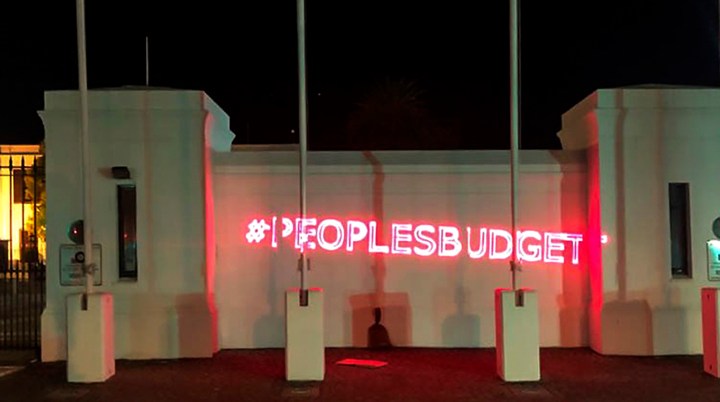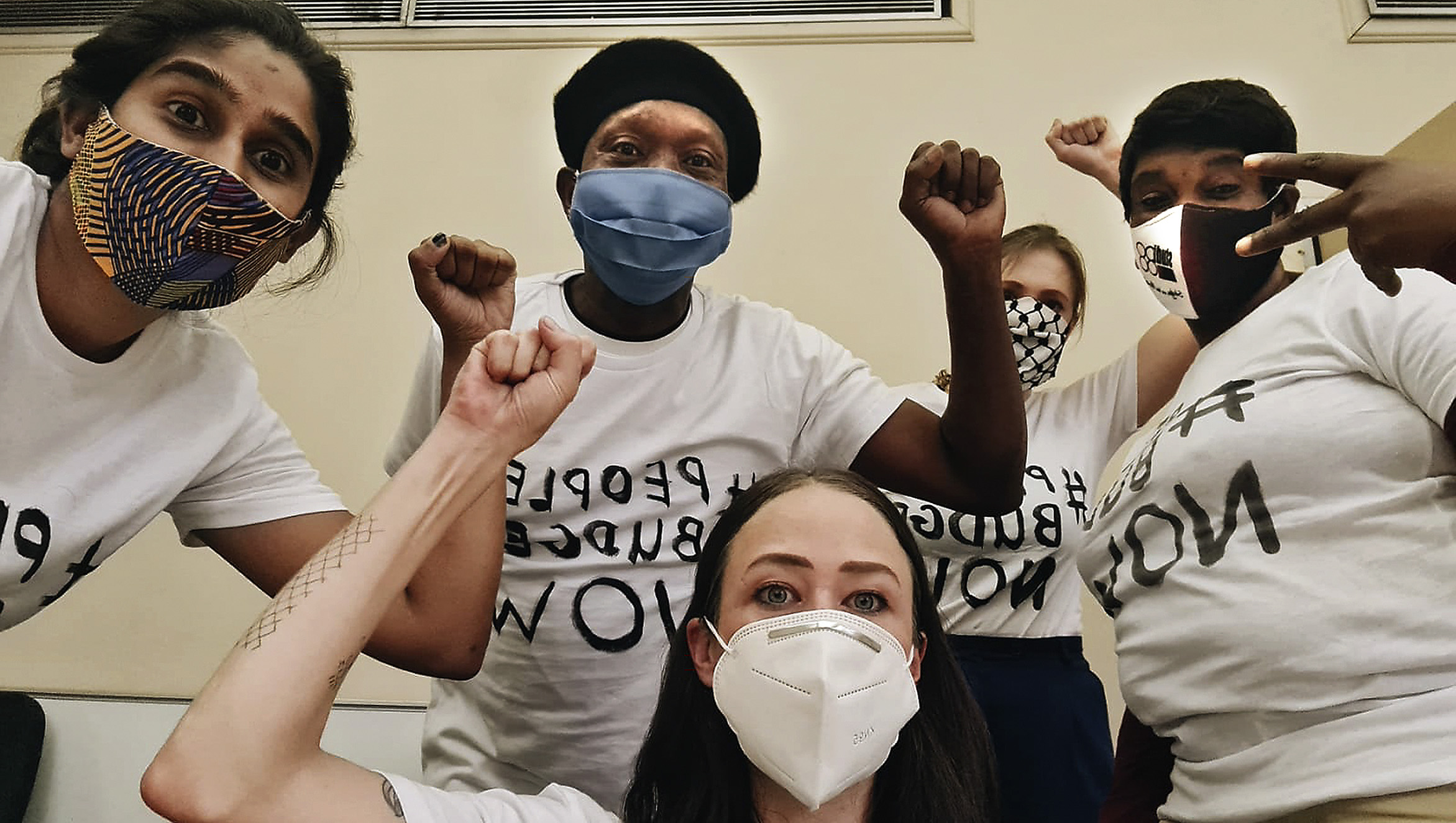MAVERICK CITIZEN OP-ED
#PeoplesBudget: Lack of public participation and accountability in #2021Budget will hurt the poorest of the poor

Amid widespread Budget Day protests and a growing call for a #PeoplesBudget, the 2021 Budget yielded unsurprising but deeply disappointing numbers for South Africa’s poor.
Finance Minister Tito Mboweni confirmed that Treasury is slashing social grants by R36-billion over the next three years. This policy shows a deep-rooted belief in neoliberalism and highlights the exclusionary nature of the Budget, which is meant to serve the people.
On Budget Day, a diverse scope of actions from a growing number of voices occurred with organisations such as Saftu, Right2Know, the AIDC and the Fight Inequality Alliance. In response, rather than respecting people’s rights to peaceful protest, activists in Cape Town were barred from protesting in a motorcade outside Parliament, rough-handled by police and security, handcuffed, and some were arrested for allegedly flouting pandemic social distancing measures.
One protest that called out the exclusionary nature of the Budget occurred when members of a civil society coalition entered the Budget Day Media “Lockup” in Pretoria, stood on their chairs holding up banners, and asked for an inclusionary, democratic, and consultative Budget.
The protest was met with irritated journalists and aghast members of Treasury, even though it followed social distancing protocols. According to the group, who were detained for a short while after the protest, they were calling for a process that includes dialogue with the people for whom the Budget is meant to provide.
Currently, the Budget is developed behind closed doors within government, Treasury and large stakeholders, but not the people. When confronted about these processes, the respondents from Treasury said that the National Economic Development and Labour Council (Nedlac), an organisation widely criticised for excluding large parts of civil society and key trade unions including Saftu, provides sufficient public consultation.
Civil society is being forced to engage in new ways of protest because while voices are increasingly calling for accountability for regressive and harmful economic policies, participation is narrowing and repression is worsening. The protest aimed to emphasise that the Budget impacts on people’s lives, in a continuation of the work that has been happening since the early days of the now-defunct Institute for a Democratic Alternatives in South Africa (Idasa) and the Budget Expenditure and Monitoring Forum (BEMF).
One of the demonstrators said that we as a people have a right to a progressive redistributive system. “We reject the currently antidemocratic nature of the Budget process and call for meaningful public participation in the Budget, as a matter of life and death, when these graphs and tables are about the people of this country.”
This action, they say, and many others, are calling for a #PeoplesBudget and demanding accountability at both the Treasury and Parliamentary levels.

Activists pose after the disruption of the Budget 2021 Media Lockup in Pretoria.
(Photo: Covid-19 People’s Coalition / Twitter)
An anti-poor Budget
Directly cutting grants is an incredibly hostile move. Cuts to non-interest expenditure (which means all social spending such as education, and health) amount to a staggering R264.9-billion over the medium term. This massive disinvestment in social spending comes at a critical time when we are in a humanitarian crisis that requires adequate and ongoing support. The Budget is largely based around an idea that there will be a “bounce back from Covid-19” – a bizarre view given that in all likelihood South Africa will still face a third wave of increased infection and deaths.
Treasury is shifting the burden of the country’s deficit on to the poorest of the poor, explicitly saying it will not collect additional tax revenue, but cut social spending instead. This, despite many civil society and grassroots organisations repeatedly asking for more robust social spending to prevent further suffering.
Worst of all, this has been done without the permission of grants claimants.
One claimant who took part in the action inside Treasury on Wednesday and asked to remain anonymous said, “I understand government to be influenced by the private sector. While we are advocating for one thing, the private sector and business is advocating for something else. In terms of the Caregivers Grant and the Social Wage, those things are my priority; but they were not addressed by Treasury.”
He says if you’ve been following the comments on the Budget, you’ll notice the private sector and business are very happy.
The government’s assertion that a lower business tax rate increases competitiveness and would “support economic recovery” is dubious at best; if companies want to shift their profits to tax havens, closing tax loopholes is the obvious solution. Instead, government is making the unfounded assumption that if tax is reduced, companies will stop profit-shifting. Furthermore, the notion that business would spend the difference on wages is a glib “trickle-down economics” argument, which has been widely debunked.
Even before this Budget, some social spending was woefully insufficient.
In January, the Child Support Grant (R440 per month) was 25% below the food poverty line (R585 per person per month) and 39% below the average cost to secure a basic nutritious diet for a child (R695 per month), according to the Household Affordability Index.
The grants system in South Africa has always been contested, but there is a growing swell of advocacy and support from various organisations such as Black Sash and #PayTheGrants, and broad consensus that the emergency grants have been insufficient. While society has been desensitised to inequality in all its faces and effects, the Budget shows an ‘increase’ in grants by R30 per month for some grants and as little as R10 for the foster care grant (a 1% increase).

Activists disrupt the Budget 2021 Media Lockup in Pretoria. (Photo: @PayTheGrants / Twitter)
The government’s attitude toward its most vulnerable has been clearly displayed in all actions surrounding the special Covid-19 grants and top-ups – short-term relief measures to help alleviate the economic fallout of the pandemic. The R350 per month Social Relief of Distress grant was the only one of these to be extended after December (and for only three months) to give social assistance to over 5.9 million people.
The effects of the pandemic, as explained by Mboweni himself, have resulted in long-term damage to individuals regarding income and food security; small businesses that have had to close, irreparable damage in families that have lost their breadwinners, and, in some cases, suicide as a result of financial crises. Livelihoods previously gleaned through informal trading, subsistence farming, vending, and domestic work have been lost.
Instead of compassion, some claimants were met with water cannon outside Sassa offices as they queued to reapply for or to receive their grants. The persistent misuse of force further demonstrates leaderships’ slant against the poor.
During the protest, two claimants say they were told “year after year” that their “input would be considered” — but without any results or accountability.
As a result, one of the protest participants says public participation in the Budget is tokenistic at best.
“Public inputs are submitted during and after the Budget is being ratified by Parliament. Yet, members of the public are the ones most affected by this Budget. Worse, the development of the Budget is an opaque process with no public consultation.” As an example, they say the lockup process is supposed to embody participatory democracy for the public to engage with the Budget at the level of Treasury, but the entire process is completely exclusionary, classist and elitist.
“How ironic that in trying to highlight this problem of exclusion through a peaceful demonstration, our group was asked to leave.”
Those involved say they hope their actions do not backfire and further exclude civil society and the public from these spaces in the future.
“Treasury consolidated its ivory tower reputation today,” says another protest participant. Despite South Africa boasting pole position on budget transparency (see the Open Budget Survey here), meaningful participation seems to be an illusion. This is concerning, especially when Budget proposals like the one presented last week will affect the poor and working-class most significantly. The Budget space is not only exclusionary but is intentionally exclusionary.
Exclusion, they explain, is core to the design of the budgetary processes. “All talk of meaningful participation is tokenistic and a pathetic attempt at appeasing civil society and the media. This ranges from the language that is used that dictates that only a select few can engage with the content to the manner in which journalists were requested to individually present their questions to Treasury today away from the rest of the media.”
This begs the question of who is holding whom to account because only a few members from civil society are allowed to participate in the lockup. They ask to what extent is civil society representation here truly representative of the diversity of civil society in South Africa and at whose discretion is access to these supposedly sacred spaces granted.
They say, “The hallowed towers of Treasury were never designed to be accessible to ordinary South Africans – this space was never open to us or for us.”
The protests on Wednesday served as a reminder to Treasury and all the media in the room that the Budget process has real implications for real people. The state’s attempt to sanitise the process and separate itself from its own deeply anti-poor and anti-working class attitudes was unsuccessful. DM/MC
Nikita Ramkissoon is site editor for Mail & Guardian Online and the former managing editor of The Daily Vox



















 Become an Insider
Become an Insider
Comments - Please login in order to comment.